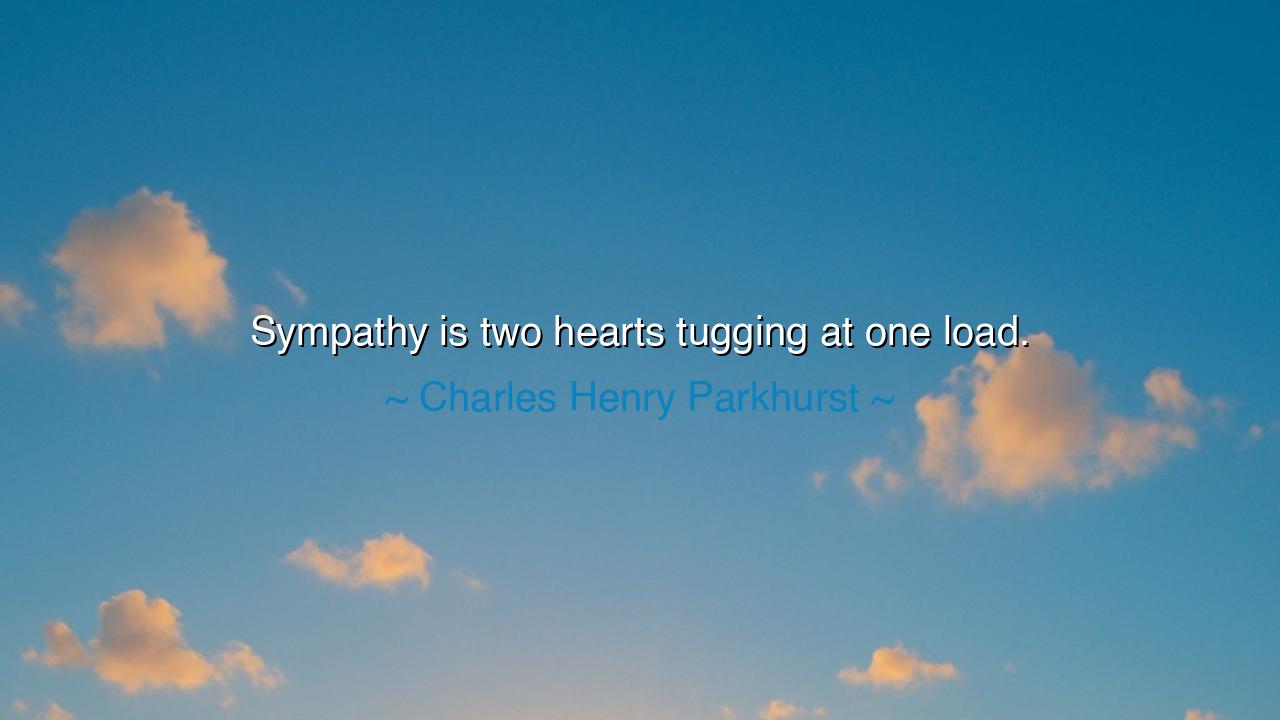
Sympathy is two hearts tugging at one load.






Charles Henry Parkhurst, a preacher of fierce moral vision, once spoke these words: “Sympathy is two hearts tugging at one load.” Simple though they may appear, they hold within them the eternal truth of human fellowship. To live is to bear burdens — grief, toil, despair, and longing. Alone, these weights may bend the soul until it breaks. But when another heart steps forward, when another spirit leans into the same weight, the impossible becomes bearable. In this brief image, Parkhurst gives us not only the meaning of sympathy, but the very essence of human solidarity.
The ancients also taught this lesson. In Homer’s epics, the greatest heroes were never truly alone. Achilles had Patroclus, whose presence shared both glory and grief. Odysseus, though famed for cunning, leaned upon his companions through endless trials. The story of friendship and loyalty has always been the story of hearts sharing a load. Where one might stumble beneath sorrow, two can move forward, even if the path is steep. Parkhurst’s image is the echo of this truth, carried from ancient firesides into modern words.
History too reveals the power of this teaching. Recall the long march of the American civil rights movement. Martin Luther King Jr., though radiant in vision, could not have borne the weight of struggle alone. The countless unnamed men and women who walked beside him, who sang in the streets, who filled the jails with courage — these were the other hearts tugging at one load. Their sympathy was not passive sorrow but active solidarity, transforming a crushing burden into a triumph that altered the course of nations.
To understand Parkhurst rightly, we must see that sympathy is not mere pity. Pity looks upon another’s suffering from a distance; it observes, perhaps even mourns, but does not share the weight. True sympathy steps forward, places its shoulder under the same yoke, and says, “We will bear this together.” This is why he speaks of tugging — for sympathy is labor, effort, a willingness to strain and sweat so that another does not walk alone.
In our own lives, how often do we miss this? We send words when presence is needed, or nod politely when another soul cries out. To live fully by Parkhurst’s wisdom is to move beyond words into deeds, beyond recognition into participation. When a friend grieves, sit with them; when a neighbor struggles, lift the weight with your own hands; when injustice falls upon another, do not look away, but take your place beside them. This is the call of true sympathy.
The lesson is clear: do not measure life by the loads you carry alone, but by the burdens you share with others. Seek not to be untouched by grief or struggle, for such a life is barren of love. Instead, seek to be one who helps bear the load, and one who allows others to bear it with you. In this mutual bearing is found the highest strength of humanity — a strength greater than wealth, sharper than power, more enduring than fame.
So remember, O children of time: sympathy is not weakness, but a union of courage. When two hearts tug at one load, the burden grows lighter, and the path, though steep, becomes possible. Let this truth guide you — in your friendships, in your families, in your nations. For it is not the solitary hero, but the shared struggle, that builds the pillars of enduring greatness. And when you walk beneath heavy weight, may you both find and be that second heart, so that no load is ever borne in vain.






AAdministratorAdministrator
Welcome, honored guests. Please leave a comment, we will respond soon